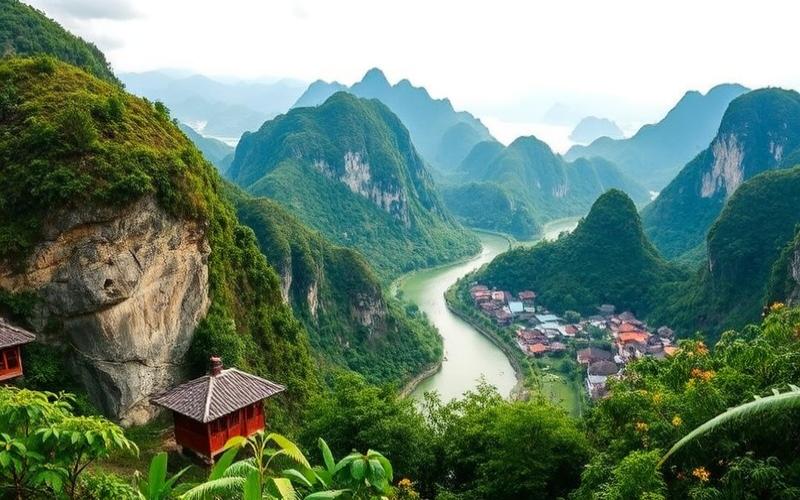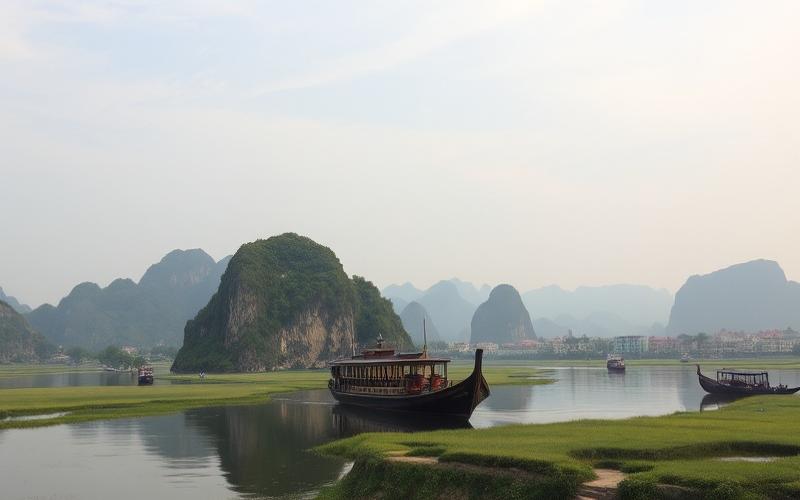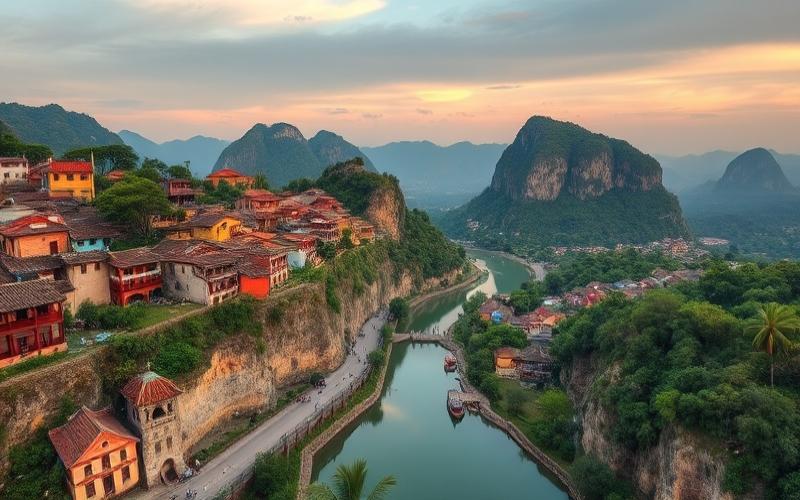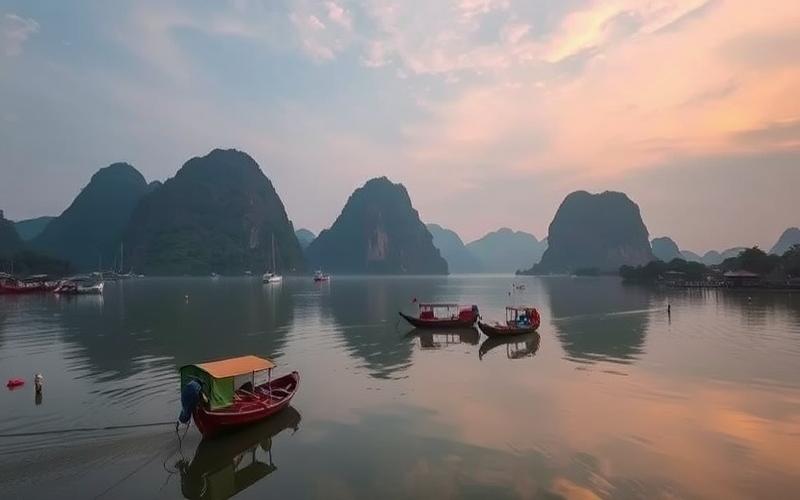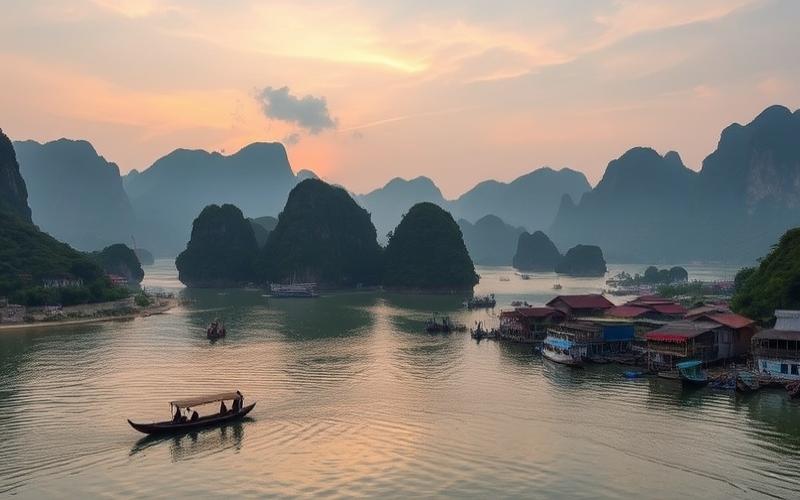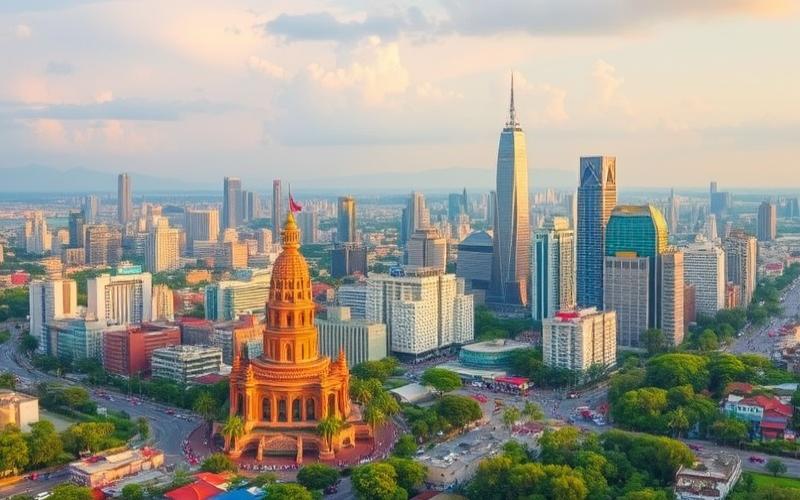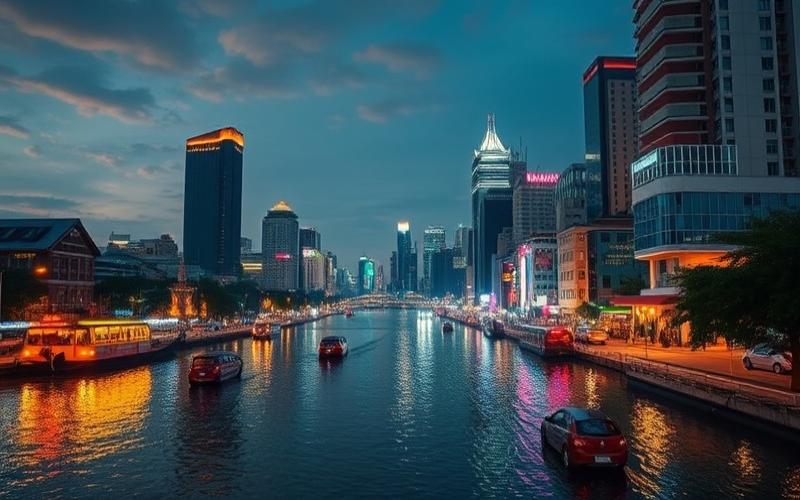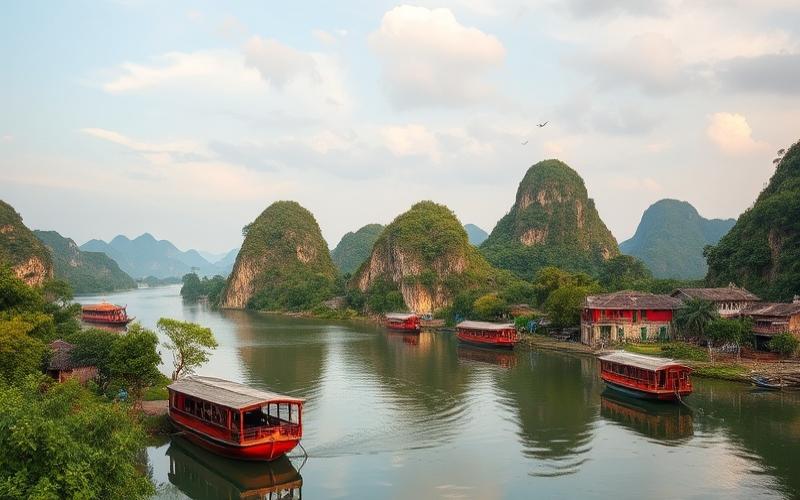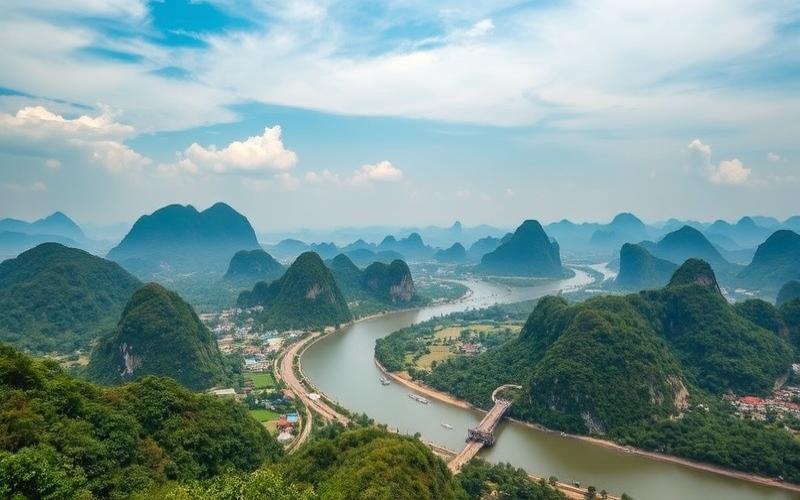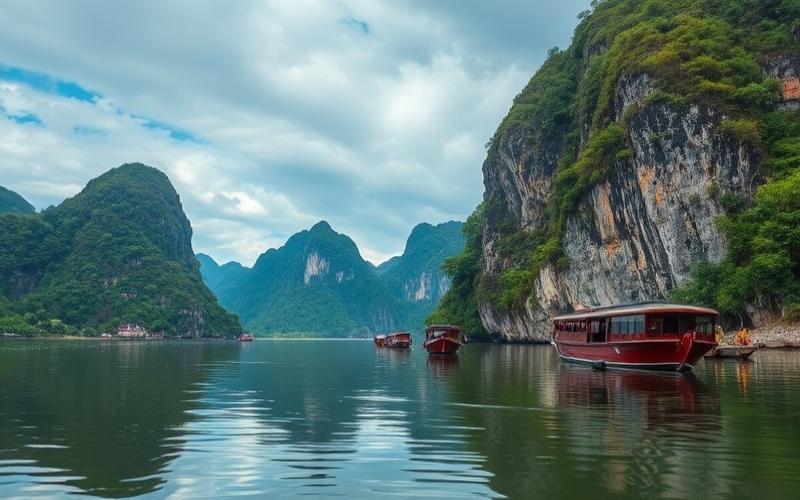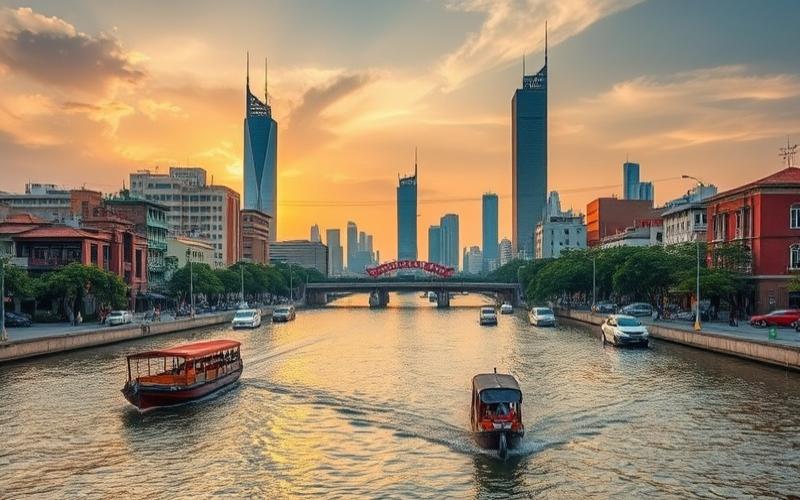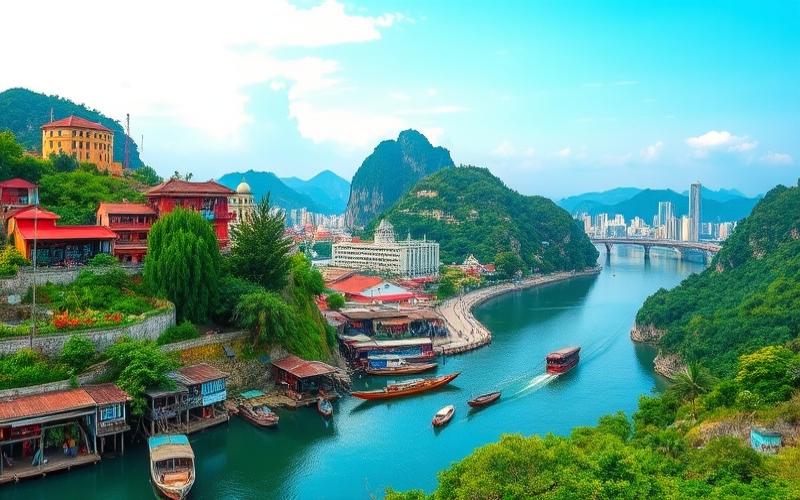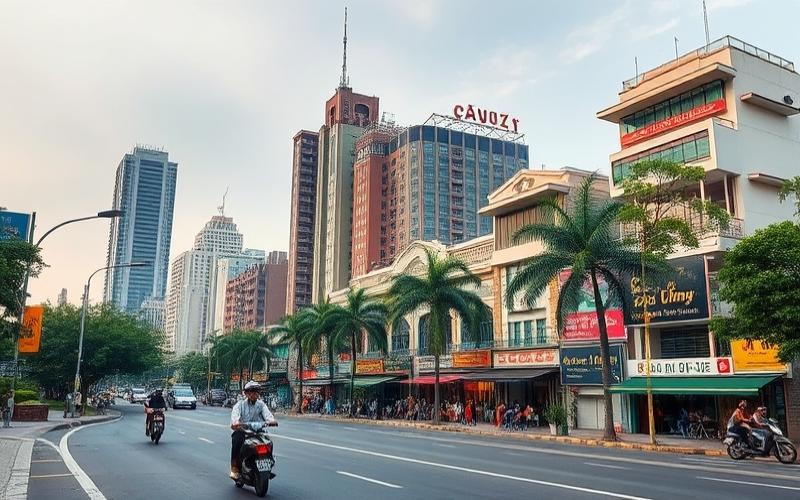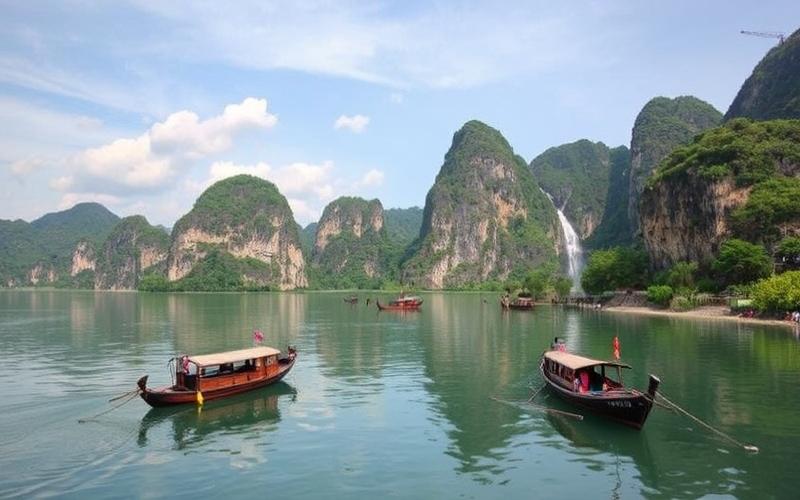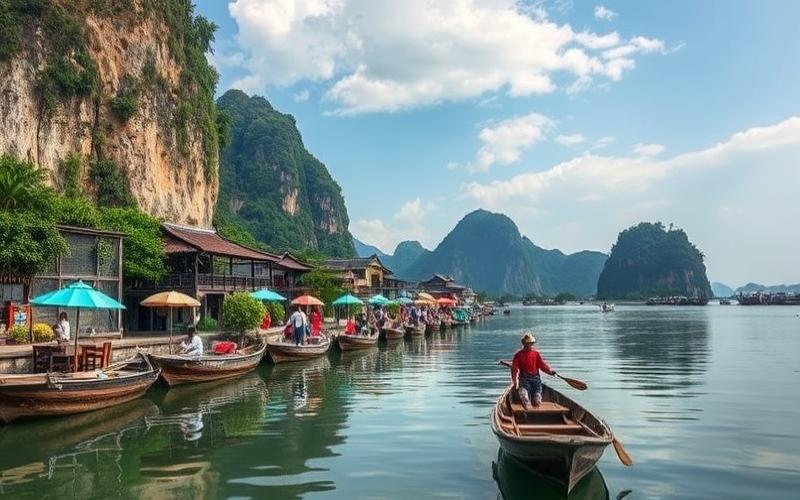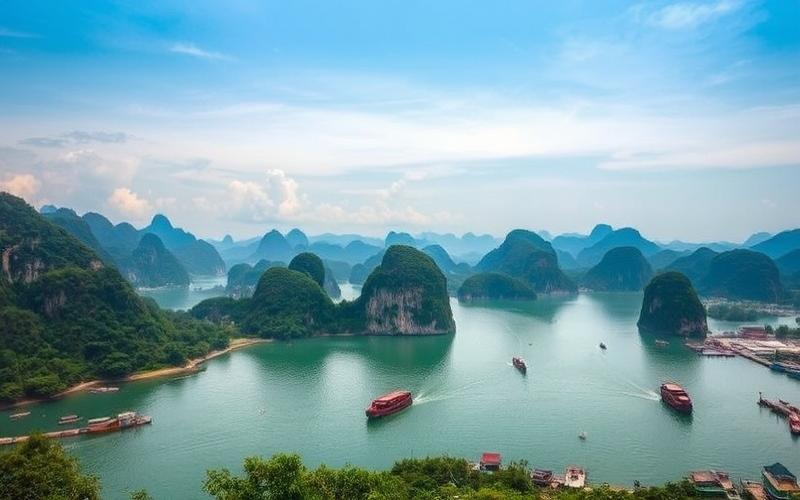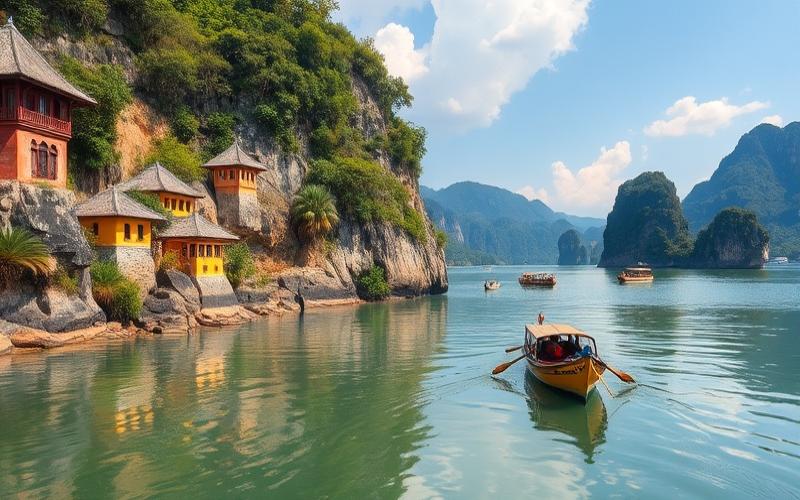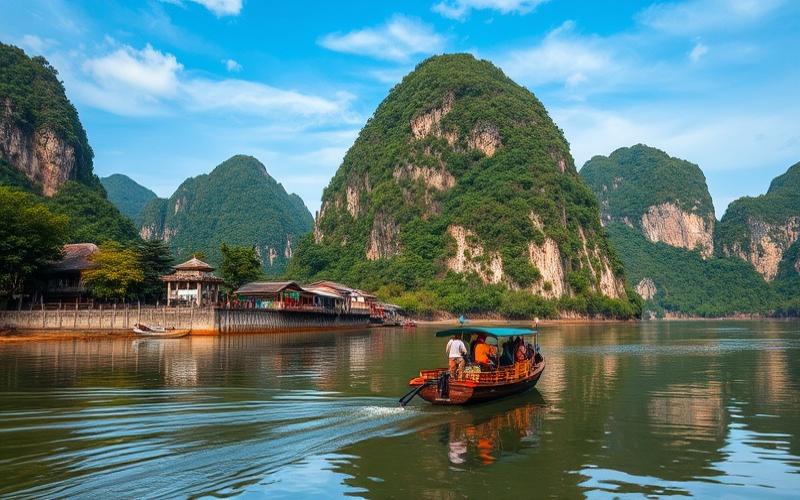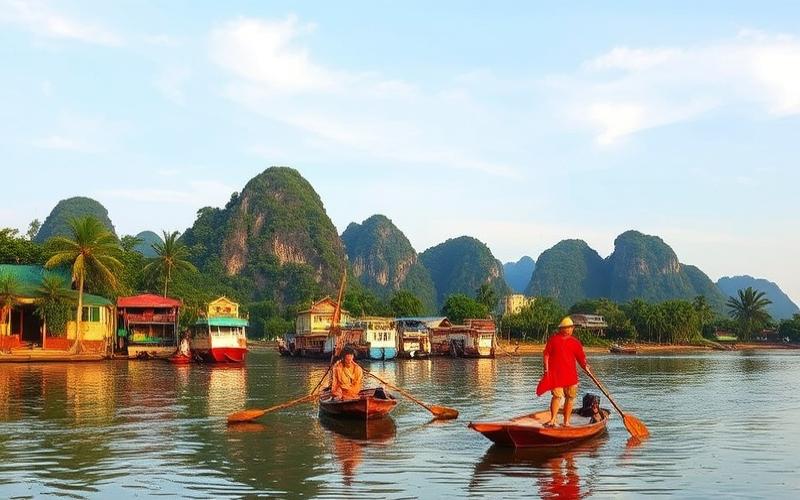
 Published on and written by Cyril Jarnias
Published on and written by Cyril Jarnias
Vietnam’s Real Estate Sector Faces Geopolitical Challenges
Vietnam’s real estate sector, which has been booming for years, now faces unprecedented challenges due to the impact of the war in Ukraine. While global attention is focused on the direct economic consequences of the conflict in Eastern Europe, it’s crucial to understand how this distant geopolitical event is influencing the Vietnamese market.
Soaring raw material prices and disruptions in international trade are among the factors redefining the stakes for Vietnamese real estate. By examining the repercussions of this global crisis, this article explores current trends, emerging opportunities, and the challenges that investors and industry professionals must now confront.
Geopolitical Consequences of the Ukraine War on Vietnam
Changes in Vietnam’s International Alliances
Vietnam has historically maintained a privileged relationship with Russia, but the war in Ukraine has pushed Hanoi to adopt a more neutral and balanced stance. The country is strengthening its policy of “omnidirectional balancing” between major powers, prioritizing diplomatic independence and autonomy. For example, the strategic rapprochement with the United States was temporarily slowed after 2022 to avoid compromising its ties with Moscow, before being revived when the international context was deemed more favorable.
- Russia Relations: Maintaining traditional ties but with increased caution.
- US Relations: Temporary postponement of strategic partnership elevation, followed by gradual resumption of discussions.
- General Approach: Emphasis on neutrality and respect for international law to avoid any strong alignment.
Effects on Vietnamese Imports and Exports
The war in Ukraine has disrupted certain essential trade flows for Vietnam:
- Energy:
- Reduction or fluctuation in crude oil supply from Russia (a major source).
- Rising global energy prices negatively impacting Vietnam’s trade balance.
- Agricultural Products:
- Initial decrease in agricultural trade with Ukraine (wheat, corn), followed by gradual recovery in 2024.
- Increased diversification toward other supplier markets.
| Sector | Main Effect | Adaptation |
|---|---|---|
| Energy | Volatility/high prices | Seeking alternatives |
| Agriculture | Decline in Ukraine-Vietnam trade | Diversification |
Repercussions on Foreign Investment and Real Estate Market
Global geopolitical uncertainty is pushing some investors to favor Vietnam as a stable destination amid increased risks elsewhere. However:
- Foreign direct investment (FDI) flows are subject to greater sectoral selectivity (manufacturing favored).
- The real estate sector indirectly benefits from this FDI through growing demand for offices/housing suitable for expatriates/foreign companies.
Potential effects:
- Occasional increase in real estate prices in certain key cities.
- Increased regulatory vigilance to prevent speculative bubbles linked to rapid capital inflows.
Regional Political Stability and International Perception of the Real Estate Market
Vietnam’s relative stability compared to its neighbors enhances its attractiveness to international investors, especially in a context where several emerging markets are experiencing tensions or secondary sanctions related to the Russia-Ukraine conflict.
- Enhanced image as a regional “safe haven” for international real estate investments
- Lower perceived risk compared to other exposed Asian economies
Evolution of Vietnam-Ukraine Relations – Vietnamese Diaspora
Diplomatic ties have intensified since late 2023 despite initial commercial slowdown. The Vietnamese diaspora in Ukraine remains affected by the security situation; nevertheless, it plays an important relay role in supporting the gradual recovery of bilateral economic exchanges.
Specific impacts:
- Vietnamese humanitarian support provided to Ukraine
- New commercial opportunities identified through renewed government dialogue
Influence on Real Estate Regulation/Policies in Vietnam
Geopolitical dynamics are prompting Hanoi to strengthen its vigilance regarding:
- Foreign capital entering the real estate sector,
- Financial transparency,
- Control against excessive speculation linked to sudden foreign investment movements caused by global instability.
Expected main directions:
- Potential regulatory tightening concerning land acquisitions by non-residents
- Targeted incentive measures for strategic projects (industrial parks/social housing)
Good to Know:
The war in Ukraine has led Vietnam to reassess its international alliances, strengthening ties with the United States while maintaining strategic relations with Russia, particularly for importing essential energy raw materials. Consequently, foreign investments, especially those from Western countries, have fluctuated, affecting the Vietnamese real estate market which seeks to attract new capital as a stable emerging market. Increased political stability in Southeast Asia reinforces investor confidence in Vietnam’s potential, although the evolution of Vietnam-Ukraine relations, including the economic impacts of the Vietnamese diaspora, may complicate this dynamic. These geopolitical aspects also influence real estate regulation, with Vietnamese authorities adapting their policies to maximize growth and minimize economic risks through more targeted international collaboration.
Key Takeaway: All these factors sometimes strengthen and sometimes complicate Vietnam’s real estate attractiveness – which remains dependent on both regional and global contexts as well as adaptive national policies in response to external shocks.
The Impact of the Ukrainian Crisis on the Vietnamese Real Estate Market
The Ukrainian crisis, triggered in 2022, has caused major economic and geopolitical upheavals worldwide. Beyond its direct repercussions on European markets, this crisis also disrupts emerging economies like Vietnam, particularly through rising raw material prices, international financial volatility, and the strategic repositioning of foreign investors.
Economic and Political Factors Influenced by the Crisis:
- Rising Construction Material Prices
Global logistical disruptions and international sanctions have led to a significant increase in the cost of importing essential materials such as cement, steel, and energy. This inflation translates into a general rise in construction costs in Vietnam. - Evolution of International Interest Rates
The global monetary response to inflation – particularly the gradual rise in key interest rates in several major economic zones – makes real estate financing more expensive for both Vietnamese developers and foreign investors. - Displacement of Foreign Capital
Geopolitical instability is prompting some international funds to seek greater security in their investments. While some countries perceived as “safe havens” temporarily benefit from an influx of investors seeking land or fiscal stability, others see their relative attractiveness diminish depending on their exposure to global risks.
| Impacted Factor | Consequence on the Vietnamese Market |
| Material Prices | Rising construction costs / project delays |
| Interest Rates | More expensive credit / decreased accessibility |
| Foreign Capital Displacement | Fluctuation in direct investments / search for stability |
Impact on Foreign Investors:
International investors are cautiously observing the overall rise in macroeconomic risk. Some are redirecting their flows toward Vietnamese real estate, considered resilient due to its strong structural growth; however, many are adjusting their strategy in the face of increased volatility.
- The increased cost of credit sometimes limits their financial leverage.
- High-end segments (luxury/tourism) remain popular but are exposed to more pronounced global cycles.
Summary List:
- Increased consideration of country risk
- Enhanced selectivity in locations (preference for major cities)
- Search for opportunities in hospitality/tourist residential
Strategic Adaptations by Local Real Estate Companies:
Faced with widespread cost increases and new international expectations:
- Systematic budget adjustments on all new projects
- Renegotiation with local/international suppliers
- Diversification toward products better suited to the domestic Vietnamese market to compensate for a potential partial withdrawal of external investors
Professionals report that “logistical delays linked to the war have forced many Vietnamese developers to revise their initial plans and now prioritize much more cautious management.” A financial manager also states: “We have seen an average increase between +8% and +15% in our material budgets since early 2022 – an unprecedented phenomenon that directly affects our profitability project by project.”
Recent Data:
According to several sectoral analyses conducted during 2024–2025:
- Hanoi: temporary decline (-16%) mainly due to international slowdown despite sustained local demand.
- Da Nang & Ho Chi Minh City: continued dynamic growth driven by international tourism (+6%/quarter for HCMV).
- Continuous increase in the number of high-end buyers seeking a patrimonial “safe haven” outside Central/Eastern Europe.
| City | Recent Price Growth | Main Trends |
| Hanoi | Recent decline (-16%) | Less short-term pressure |
| Da Nang | Moderate increase | Foreign tourist demand |
| Ho Chi Minh City | Sustained increase (+6%/qtr.) | Rapid post-health crisis recovery |
Professionals unanimously emphasize that “the period now requires more than ever operational flexibility and permanent anticipation,” while confirming that “the fundamentally supportive foundation remains intact.”
In summary, while the Ukrainian crisis did not cause a brutal collapse but rather a profound restructuring of Vietnamese real estate dynamics – pushing them toward greater strategic selectivity both on the investor and local operator sides.
Good to Know:
The Ukrainian crisis has had notable repercussions on the Vietnamese real estate market due to its effects on the global economy. The increase in construction material prices, exacerbated by instability in Eastern Europe, has driven up real estate development costs in Vietnam. This, coupled with evolving global interest rates, has also influenced the displacement of foreign capital, prompting some investors to reconsider their positions in the country. Vietnamese real estate companies have had to readjust their investment strategies, sometimes slowing new projects or turning to less expensive alternative materials. Developer testimonies reveal that despite these challenges, Vietnam’s economic robustness still attracts investors, although their perception is nuanced by geopolitical uncertainty. According to recent data, some professionals note increased demand for more affordable properties, posing new strategic challenges in the sector.
Influx of Ukrainian Refugees and Housing Challenges in Vietnam
Influx of Ukrainian Refugees to Vietnam:
Recent statistics indicate that Vietnam has welcomed a limited number of Ukrainian refugees since the conflict began. No comprehensive official data is available on the exact number of Ukrainian refugees in Vietnam, unlike Europe where over 6 million Ukrainian refugees have been registered, primarily in Germany, Poland, and Russia. Flows to Vietnam remain marginal compared to these countries, although it is estimated that the Ukrainian community has experienced notable growth in major Vietnamese cities since 2022.
Housing Market Challenges in Major Vietnamese Cities:
The arrival of Ukrainian refugees, although modest in volume compared to Europe, adds to pre-existing housing market challenges in cities like Ho Chi Minh City and Hanoi:
- Shortage of Affordable Housing: Demand for housing, already exceeding supply in urban segments, has intensified.
- Price Increases: The increase in demand, even marginal, has contributed to slight upward pressure on rents and sale prices, particularly in central neighborhoods and areas near economic hubs.
- Limited Availability: Social and intermediate housing, already scarce, is quickly saturated.
| Challenge | Situation Before 2022 | Impact of Ukrainian Influx |
|---|---|---|
| Rental Prices | Upward trend | Accentuation of increase |
| Availability | Supply below demand | Increased saturation in some neighborhoods |
| New Construction | Slow growth, bureaucracy | Accelerated initiatives (see below) |
Government and Community Initiatives:
- Government:
- Temporary provision of public housing or university dormitories for the most vulnerable arrivals.
- Administrative facilitation for obtaining residence permits and access to private housing.
- Local Communities and NGOs:
- Establishment of welcome and mutual aid networks.
- Sponsorship programs to assist with housing search and integration.
- Private Sector:
- Some real estate agencies offer dedicated services for expatriates and Ukrainian refugees.
- Development of new real estate projects targeting foreign or international clientele.
Effects on the Local Real Estate Market:
- Prices: Occasional increase in certain neighborhoods popular with expatriates and refugees.
- Availability: Rapid decrease in furnished housing and medium-sized apartments.
- Construction: Acceleration of some residential projects, particularly in suburbs, but delays persist due to administrative complexity.
Cultural and Socio-Economic Impacts:
- Cultural:
- Enrichment of local diversity through introduction of new Ukrainian cultural, culinary, and artistic practices.
- Strengthening of intercultural exchanges, particularly in education and community sectors.
- Socio-Economic:
- Ukrainian refugees, often qualified, contribute to certain professional sectors (education, services, technology).
- Increased pressure on urban infrastructure (housing, transport, healthcare).
- Creation of transnational economic networks (import-export, gastronomy, specialized services).
Potential Long-Term Evolution:
- Gradual integration of refugees, especially among younger individuals and families, through Vietnamese language learning and professional insertion.
- Transformation of certain neighborhoods into multicultural hubs, revitalizing the local economy.
- Risk of social tensions if housing pressure intensifies without sufficient supply adaptation.
The influx, although limited, reveals the fragility of the Vietnamese real estate market in the face of even moderate migratory shocks, while offering an opportunity for cultural openness and social innovation for host communities.
Good to Know:
Since the conflict began, approximately 5,000 Ukrainian refugees have arrived in Vietnam, a relatively small number compared to flows to Europe, but which nevertheless exacerbates housing challenges in overcrowded cities like Ho Chi Minh City and Hanoi. The already tight real estate market is seeing price increases and decreased availability of affordable housing, accentuating the housing crisis. The Vietnamese government has implemented several initiatives such as allocating temporary housing and encouraging rapid construction projects to meet growing demand. These measures aim to stabilize the market, but they risk increasing construction material prices, thus influencing the local economy. Culturally, refugee integration is progressing gradually with socio-economic impacts, such as increased diversity and new economic opportunities, although tensions may arise long-term regarding local resources.
Foreign Investments: Vietnam’s Place in the Current Geopolitical Context
Foreign investor interest in Vietnam is experiencing notable growth in the current geopolitical context marked by the war in Ukraine. Tensions in Europe and the search for risk diversification are increasingly prompting international actors to redirect their investment flows toward Southeast Asia. Vietnam stands out as a preferred destination, benefiting from its political stability and economic growth dynamics.
Factors Favoring Vietnam as an Investment Destination:
- Political Stability: the country is perceived as a safe and predictable environment for foreign investors.
- Robust Economic Growth: FDI flows have reached record levels, with an 8.1% year-on-year increase in the first half of 2025 and an unprecedented amount over five years.
- Sectoral Diversification: real estate attracts approximately 24% of foreign direct investments, behind manufacturing and processing.
Effects of European Tensions and the War in Ukraine:
- Uncertainties in Europe are pushing investors to seek alternative markets, less exposed to geopolitical and energy risks.
- Global FDI flows, traditionally directed toward Eastern Europe, are redeploying toward Asian emerging markets, particularly Vietnam.
- Real estate investors are seeking to diversify their portfolios internationally, reducing their exposure to European instability.
Incentives Offered by the Vietnamese Government:
- Partial or total tax exemptions for several years.
- Facilitated access to land for strategic projects.
- Simplified administrative procedures for investment registration.
- Logistical support and dedicated infrastructure in special economic zones.
Key Recent Figures (2025):
| FDI Beneficiary Sector | Amount (in billion USD) | Share of Total |
| Manufacturing and Processing | 12.0 | 56.6 % |
| Real Estate | 5.17 | 24.0 % |
| Sciences and Technologies | 1.18 | 5.6 % |
| Water and Waste Treatment | 0.90 | 4.2 % |
Origin of Main FDI Flows:
- Singapore: 21.4% of flows (4.6 billion USD)
- South Korea: 14.3% (over 3 billion USD)
- Other major Asian partners, strengthening their presence through strategic partnerships.
Recent Partnerships and International Agreements:
- Strengthened cooperation with Singapore, South Korea, and Japan in real estate, infrastructure, and high-tech sectors.
- Signing of free trade agreements and bilateral agreements aimed at facilitating capital flows and investment protection.
Consequences for International Real Estate Investors:
- Portfolio diversification: Vietnam becomes a preferred option to reduce dependence on European markets.
- Search for yield in a less geopolitically exposed environment.
- Growing interest in residential, commercial, and industrial segments, driven by rapid urbanization and population growth.
Key Takeaway:
In the context of global uncertainty and tensions in Europe, Vietnam is establishing itself as a strategic alternative for foreign investors, driven by its stability, fiscal incentives, and affirmed openness policy. The real estate sector, in particular, benefits from this repositioning of FDI flows, reinforced by dynamic international partnerships.
Good to Know:
The war in Ukraine has prompted many foreign investors to reorient their strategies, seeing Southeast Asia, and particularly Vietnam, as an attractive destination to diversify their real estate portfolios. Vietnam, with its political stability and sustained economic growth, is emerging as a promising alternative to European geopolitical uncertainty. The Vietnamese government is sparing no effort to attract these investors, offering attractive incentives, particularly in the real estate sector, such as tax exemptions and administrative simplifications. Furthermore, recent international partnerships that Vietnam has established strengthen its integration into the global economy, thereby increasing investor confidence. These pragmatic strategies and incentives add an additional dimension to the potential of the Vietnamese real estate market in the current context, making the country increasingly popular among investors seeking to secure their capital while benefiting from the region’s economic boom.
Disclaimer: The information provided on this website is for informational purposes only and does not constitute financial, legal, or professional advice. We encourage you to consult qualified experts before making any investment, real estate, or expatriation decisions. Although we strive to maintain up-to-date and accurate information, we do not guarantee the completeness, accuracy, or timeliness of the proposed content. As investment and expatriation involve risks, we disclaim any liability for potential losses or damages arising from the use of this site. Your use of this site confirms your acceptance of these terms and your understanding of the associated risks.



